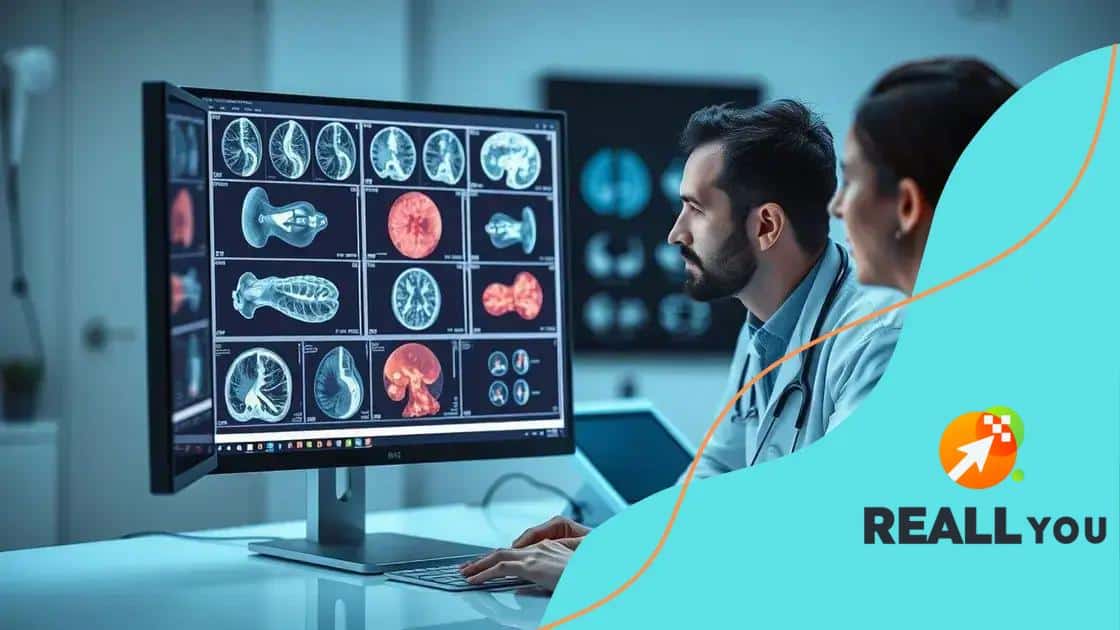How AI-powered healthcare is improving patient outcomes

Anúncios
AI-powered healthcare significantly improves patient outcomes by enhancing diagnostics, personalizing treatment plans, and facilitating better patient management through data analysis and predictive analytics.
How AI-powered healthcare is improving patient outcomes has become a hot topic in the medical community. Imagine a world where technology not only assists doctors but also enhances patient care. Curious how this technology is reshaping healthcare?
Anúncios
Understanding AI in healthcare
Understanding AI in healthcare is vital for grasping how it transforms patient care. This technology uses algorithms and data to enhance decision-making in medical practices. Imagine a doctor with the ability to analyze vast amounts of data in seconds, leading to faster and more accurate diagnoses.
Anúncios
How AI Works in Healthcare
AI integrates with various healthcare systems to streamline operations. Algorithms process patient information, identifying patterns that might go unnoticed by humans. This not only helps in diagnostics but also in predicting potential health issues before they become critical.
Key Benefits of AI in Healthcare
- Improved diagnostics: AI can analyze medical images and reports more accurately.
- Personalized treatment: Tailors care based on individual patient profiles.
- Efficiency in operations: Reduces administrative burdens for healthcare providers.
- Enhanced patient monitoring: Tracks patient progress and alerts providers to changes.
This innovation enables healthcare professionals to focus more on patient interaction rather than spending valuable time on paperwork. By utilizing AI, medical staff can prioritize their tasks and deliver better care to those who need it most. Insisting on efficient use of resources is crucial in today’s healthcare landscape.
Challenges of Implementing AI
While AI offers significant advantages, there are challenges to consider. Privacy concerns regarding patient data are paramount. Also, integrating new technology into existing systems can be complex. However, the potential benefits far outweigh these obstacles, as long as proper measures are taken.
In summary, understanding AI in healthcare is essential for anyone interested in the future of medicine. By embracing this powerful tool, healthcare providers can enhance the quality of care, ultimately leading to better patient outcomes.
Benefits of AI for patient management
The benefits of AI for patient management are numerous and impactful. By integrating artificial intelligence into healthcare systems, providers can enhance how they monitor and care for patients. Imagine having a system that predicts patient needs and streamlines their journey through healthcare.
Enhanced Patient Engagement
AI tools can keep patients informed and engaged in their care. Through mobile apps and chatbots, patients receive reminders for appointments and medication. This constant communication helps ensure they follow their treatment plans effectively.
Improved Data Analysis
AI can analyze vast amounts of patient data quickly. By identifying patterns and trends, healthcare professionals can make informed decisions. This leads to better treatment plans tailored to individual patient needs.
- Faster response times: AI systems help providers act swiftly on patient requests and data.
- Reduced readmission rates: By anticipating issues, AI can help prevent patients from returning to the hospital.
- Better resource allocation: AI enables healthcare facilities to optimize their staff and materials according to patient needs.
- Real-time updates: Continuous monitoring allows for timely interventions when a patient’s condition changes.
As healthcare evolves, understanding how AI can enhance patient management becomes essential. These systems not only improve operational efficiency but also enhance the overall patient experience. With AI tools, doctors spend more time focusing on patients, ultimately leading to better outcomes.
The integration of AI into patient management is beneficial for everyone involved. As needs grow, so do the solutions that technology like AI can provide. It’s a promising shift towards more effective healthcare.
AI applications in diagnostics

AI applications in diagnostics are revolutionizing how medical professionals identify and treat diseases. By leveraging advanced algorithms, AI systems can analyze medical data and assist in making accurate diagnoses.
Role of AI in Medical Imaging
AI technologies enhance medical imaging by providing tools that assist radiologists in interpreting X-rays, MRIs, and CT scans. These systems can identify abnormalities with precision, leading to quicker diagnoses. For instance, AI can detect early signs of diseases such as cancer, often before they are visible to the human eye.
Predictive Analytics for Disease Detection
AI also plays a crucial role in predictive analytics. By examining vast datasets, including patient histories and test results, AI can predict the likelihood of a disease occurring. This allows healthcare providers to intervene earlier and tailor preventive measures based on individual risk factors.
- Rapid analysis: AI can process images faster than traditional methods.
- Increased accuracy: Reduces human error in reading diagnostic tests.
- Cost-effective solutions: Minimizes unnecessary tests and procedures.
- Integration with electronic health records: Streamlines workflow and enhances data accessibility.
Additionally, AI systems continuously learn and improve. This means the more they process data, the better they become at identifying patterns. As a result, the integration of AI in diagnostics not only enhances efficiency but also improves patient outcomes significantly.
Using AI in diagnostics ensures that healthcare professionals have reliable support in their decision-making processes. The potential benefits of utilizing these innovative technologies in healthcare cannot be overstated, paving the way for smarter, more efficient healthcare solutions.
Improving treatment plans with AI
Improving treatment plans with AI is a significant advantage in healthcare today. By analyzing patient data, AI systems can help create personalized treatment options that cater to individual needs. This allows doctors to move beyond standard protocols and provide more effective care.
Data-Driven Insights
AI applications can process large amounts of information quickly. By examining medical history, genetic data, and lifestyle factors, AI can identify the most effective treatments for each patient. This tailored approach increases the chances of successful outcomes.
Collaborative Care
AI enhances collaboration among healthcare providers. With shared access to real-time patient data, different specialists can work together more efficiently. This ensures that every aspect of a patient’s care is coordinated, leading to better health management.
- Customized medication plans: AI can suggest the best medications and dosages.
- Identify potential side effects: AI predicts how patients may respond to treatments.
- Streamlined follow-up care: Ensures that patients receive necessary check-ins and adjustments to their treatment plans.
- Improved patient education: AI tools can provide patients with information tailored to their treatment plans.
Furthermore, the integration of AI into treatment planning allows healthcare providers to monitor patient progress continuously. By analyzing responses to treatment in real time, adjustments can be made promptly, ensuring that patients receive the best care possible.
The future of healthcare relies heavily on the advancements made by AI. As these technologies continue to evolve, the ability to enhance treatment plans will only improve, leading to better health outcomes and patient satisfaction.
Future trends in AI healthcare solutions
Future trends in AI healthcare solutions show great promise for transforming the medical landscape. As technology advances, AI will play a crucial role in making healthcare more efficient and patient-centered. Innovations are emerging to enhance diagnostics, patient management, and treatment plans.
Integration of AI with Telehealth
Telehealth has gained momentum, especially in recent years. AI will further enhance telehealth capabilities by providing real-time analytics. This allows healthcare providers to monitor patient conditions remotely, ensuring timely interventions when necessary.
Personalized Medicine through AI
The future will see a rise in personalized medicine, where AI analyzes genetic information to tailor treatments. By understanding a patient’s unique genetic makeup, healthcare providers can recommend therapies that are more effective and have fewer side effects.
- AI-powered wearable devices: These can continuously monitor health metrics, sending data to healthcare providers for analysis.
- Predictive analytics: AI can forecast health issues based on patient data, allowing for early intervention.
- Natural language processing: This technology can streamline patient communication and enhance medical documentation.
- Blockchain technology: Integrating AI with blockchain can securely manage patient data, ensuring privacy and accessibility.
As AI technologies evolve, their integration into everyday healthcare will become more seamless. This means healthcare providers will have the tools to make informed decisions quickly, improving the overall patient experience. The emphasis will be on preventive care, effectively reducing healthcare costs while enhancing the quality of care.
Understanding these emerging trends in AI healthcare solutions is vital for both providers and patients. By staying informed, stakeholders can better prepare for the changes that will shape the future of healthcare.
As we look towards the future, the integration of AI in healthcare is set to transform patient care and medical practices. The advancements in AI applications will lead to enhanced diagnostics, improved treatment plans, and better patient management. By embracing these technologies, healthcare providers can offer more personalized and efficient care. As a result, patients can look forward to better health outcomes and a more engaging healthcare experience. Staying informed about these trends will empower both providers and patients alike as they navigate this rapidly changing landscape.
FAQ – Frequently Asked Questions about AI in Healthcare
How is AI improving patient care?
AI enhances patient care by providing personalized treatment plans, faster diagnostics, and continuous monitoring, leading to better health outcomes.
What role does AI play in diagnostics?
AI analyzes medical data to identify patterns and detect diseases earlier and more accurately than traditional methods.
Can AI help with patient management?
Yes, AI streamlines patient management by predicting health issues, improving communication, and assisting healthcare providers in making informed decisions.
What are the future trends in AI healthcare solutions?
Future trends include AI integration with telehealth, personalized medicine, and advanced predictive analytics to enhance patient care and operational efficiency.







